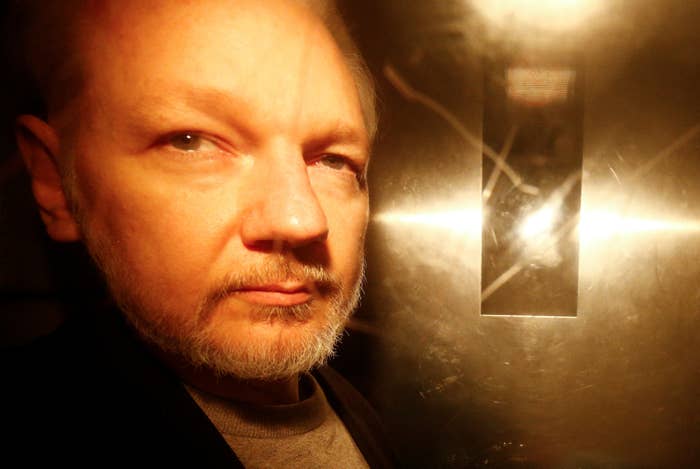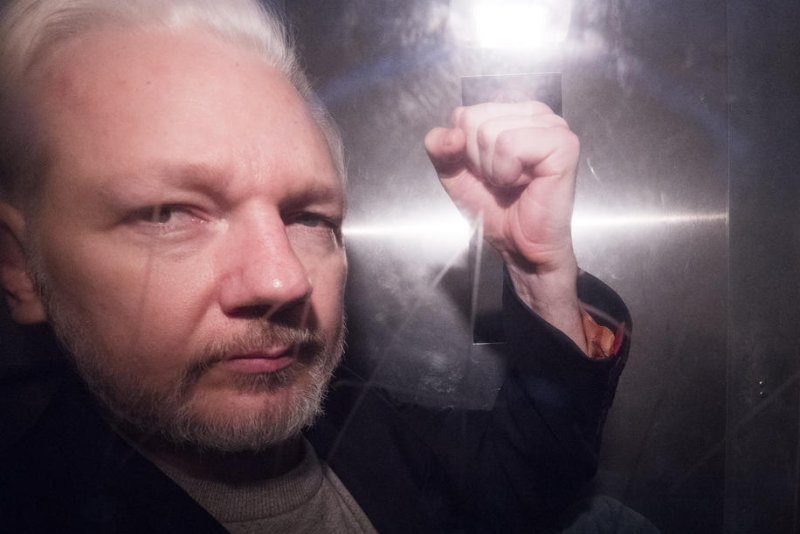Prosecution of Assange Is an Attack on Our Own Humanity
"The verdict will not only determine the life of Assange, but also the future of journalism."
Published on

Supporters of WikiLeaks founder Julian Assange protest outside London's Old Bailey court as his fight against extradition to the U.S. resumed on September 7, 2020. (Photo: Richard Baker/In Pictures/Getty Images)
On January 4, 2021 the London Court will release the hearing verdict of WikiLeaks publisher Julian Assange’s US extradition case. The indictment against Assange is politically motivated. Judge Vanessa Baraitser, who is presiding over hearings, has even acknowledged the political nature of this case when she decided not to rule until at least after the US Presidential election on November 3, 2020.
The verdict will not only determine the life of Assange, but also the future of journalism. The extra-territorial overreach involved in the US government charging a journalist who exposed their war crimes under the Espionage Act threatens press freedom everywhere. This is why all major media and human rights organizations have now stepped forward to oppose the extradition proceedings against Assange.
Their message is clear. Publishing documents that are verified to be authentic and are of public interest is not a crime. It is a central role of the press in a functioning democracy to defend the public’s right to know, and to help keep the government honest. WikiLeaks has done exemplary work in fulfilling this duty. This is journalism, and journalism is not a crime.
The attempted prosecution of Assange is already creating chilling effects on journalists, with a dangerous precedent having been set. One Turkish journalist has now been sentenced to more than 27 years in prison for allegedly supporting terrorism and engaging in political espionage. As we now face a critical moment for our democracy, it is important for us to think about what this war on journalism means and what WikiLeaks represents to all of us.
The collateral murder video
Since its public prominence in 2010 with the publication of the Collateral Murder video, WikiLeaks has changed the face of modern journalism. The release of this 2007 classified military footage, depicting a US Army helicopter gunship attack in Iraqi suburb of New Baghdad, created an international sensation. At the time the video was posted online, the WikiLeaks website temporarily crashed due to the massive influx of visitors, while versions popping up on YouTube reached millions.
This uncensored glimpse into a US invasion of a foreign land shocked the American public, who has been kept well insulated from the operational reality by mainstream media. Visceral images of the US army’s brutal murder of innocent civilians, including two Reuters’ journalists, brought impetus for change. It affected people profoundly, triggering anger, deep sadness, and a sense of betrayal by their own government.
The moving pictures unfolding in the 17-minute film display casual cruelty, with soldiers calling Iraq civilians “dead bastards”, and congratulating each other on the ability to kill in larger numbers. Through the transparent lens of the WikiLeaks hourglass, their savagery is further stripped bare, as the Weapons Arsenal team is seen attacking a wounded person attempting to crawl to safety.
Confronted by this bleak moral terrain, many of us were overcome with despair and hopelessness. Yet, it was not just destruction that was revealed to us. In the forbidden landscape, made available by the WikiLeaks source, a force was found that could redeem the human spirit. It was the conscience of an ordinary person which gave new life to this grotesque image of horrific death.
Awakening of heart
Former US Army analyst Chelsea Manning, through her act of whistleblowing, shed light on the Bush era’s War on Terror. In witnessing everyday life in Iraq under US military occupation, Manning was able to gain access to a perspective that had been suppressed. In the scenes shot from the gunsight of an Apache helicopter she saw another person whose life was as precious as hers, not the “enemy combatants” that she had been trained to see. In that moment, she was able to restore truth - articulated in her words, “We’re human . . . and we’re killing ourselves.”
The heart of another also responded to the life-affirming urge that gave Manning the courage to act out of what she believed to be right. Former US army specialist Ethan McCord, who was involved in the incident in New Baghdad, was captured on video rescuing the wounded children from the vehicle targeted by the Apache helicopter. He came forward after viewing the video published by WikiLeaks.
McCord recalled the moment he grabbed the little girl from amidst the carnage and ran for help. Later that day, as everyone ignored what had happened, McCord could not. This was his moment where that artificial wall between “enemy combatant” and soldier crumbled. He recounted this experience:
“I went to my room to try to clean the children’s blood from my uniform. Fighting back tears from what I’d seen, my emotions were taking over; the very thing that the army taught us not to do in war, I was doing. My humanity and love for the human race was overcoming everything they taught me.”
Information that is freed becomes more than just facts; it becomes a story whose gentle lips tremble with urgency, aching to speak. We begin to feel for each other, and to remember our inherent obligations to one another.
Courage is contagious
The courage that awakened our sense of shared humanity became contagious. It lifted a dark cloud of apathy and inspired the hearts of the youth who grew up on the internet. Under the WikiLeaks banner, people around the world came together to engage in creative acts, harnessing the new citizen journalism which carried with it a torch of justice.
At the end of 2010, after WikiLeaks began publishing troves of sensitive US diplomatic cables, the organization came under heavy pressure by the US government and its allies. Help for the whistleblowing site swiftly emerged from deep inside the web.
When the Tunisian government blocked the release of the US diplomatic cables, benevolent hackers who were sympathetic to the whistleblowing site came and redirected Tunisian government websites to WikiLeaks and exposed the corruption of the Ben Ali regime. At the same time, distributed denial of service (DDoS), the digital equivalent of a sit-in protest, was carried out - providing some redress of grievances by temporarily disabling Tunisian government websites.
When an extrajudicial financial blockade was imposed on WikiLeaks by PayPal, Visa, MasterCard and others refusing to process donations to the organization, the loosely tied online network Anonymous sprung into action in support of WikiLeaks. They engaged in online protests to defend free speech.
The spirit of revolt moving across digital screens began to push the internet generation out onto the streets. From the Arab Spring to the Occupy Wall Street movement, WikiLeaks publications sparked global revolutionary uprisings. Empowered by information, ordinary people who had been rendered spectators in our democracy began to claim their own significance.
Power of love
Chelsea Manning, with her extraordinary courage, stood up against the military industrial complex. She risked her freedom and her life to halt the operation of the machine that turns us into commodities, fodder for extractive capitalism.
By following a tiny voice of conscience, she freed our brothers and sisters who had become faceless and nameless objects, enslaved by the subject position in US imperial supremacy. She helped to restore the primacy of the human heart. Assange used journalism as a tool to defend this sacred heart, allowing it to speak freely, and to let the world hear its voice loud and clear.
WikiLeaks publications gave dignity to the victims of the senseless wars of the US government and their allies. The release of documents concerning the US war on the Middle East revealed 15,000 previously unknown and uncounted murdered Iraqis, and showed 20,000 civilians assassinated by massacre and night raids in Afghanistan. Their commitment to provide their full document archives to the public, with a very rigorous redaction process in place, made it possible for a German citizen - kidnapped and tortured by the CIA after being mistakenly identified as a terrorist - to obtain justice.
Together, Manning and Assange gave us all a gift of seeing ourselves truthfully, to regard each other’s life as being valuable. This awakening of our hearts to our shared humanity opened a possibility for a society based on a principle of love. It is a world beyond borders, where we can relate to one another on a plane of equality, without oppressive mechanisms that separate us.
For this act of liberation, WikiLeaks has been declared an enemy by nearly every powerful state. Assange has been character assassinated, arbitrarily detained without charge for years, and his human rights have been seriously violated. He has been psychologically tortured and spied on. He is now held inside London’s maximum-security prison, alongside murderers and terrorists, facing the risk of extradition to the US, where he could receive no fair trial.
The attempt to prosecute Assange is an assault on our own humanity. As the delivery of the verdict is approaching, the PixelHELPER Gospel Choir performed in front of Belmarsh prison, calling for freedom for this award winning journalist. The empire reaches its hands over Assange trying to squash the heart of democracy forever. Yet the idea that has inspired our collective action cannot be killed. It is kept alive through our courage to stand in our own power and speak truth.
Julian Assange is a journalist, computer programmer and human rights defender. He is a son, a father of two young children and a partner of his loving fiancée. He is a hero and champion of the oppressed, who dedicated his life to crush bastards and nurture the vulnerable. He is our brother who believes in each of us, our ability to self-determine a course of our lives. He is you and me. He is all of us. History will be kind to our friend.








